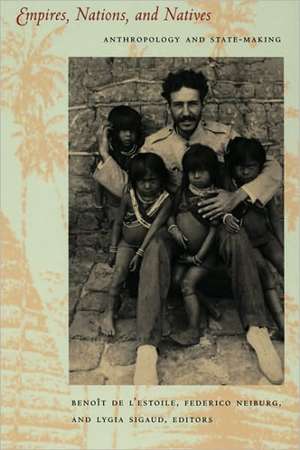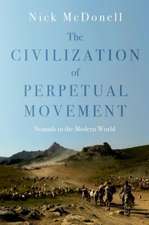Empires, Nations, and Natives – Anthropology and State–Making
Autor Benoît De L`estoile, Federico Neiburg, Lygia Maria Sigauden Limba Engleză Paperback – 21 sep 2005
Preț: 266.34 lei
Nou
Puncte Express: 400
Preț estimativ în valută:
50.97€ • 53.02$ • 42.08£
50.97€ • 53.02$ • 42.08£
Carte tipărită la comandă
Livrare economică 14-28 aprilie
Preluare comenzi: 021 569.72.76
Specificații
ISBN-13: 9780822336174
ISBN-10: 0822336170
Pagini: 344
Ilustrații: 11 illustrations
Dimensiuni: 155 x 237 x 21 mm
Greutate: 0.5 kg
Ediția:New.
Editura: MD – Duke University Press
ISBN-10: 0822336170
Pagini: 344
Ilustrații: 11 illustrations
Dimensiuni: 155 x 237 x 21 mm
Greutate: 0.5 kg
Ediția:New.
Editura: MD – Duke University Press
Cuprins
Acknowledgments vii
Introduction: Anthropology and the Government of “Natives,” a Comparative Approach / Benoît de L’Estoile, Federico Neiburg, and Lygia Sigaud 1
Rationalizing Colonial Domination? Anthropology and Native Policy in French-Ruled Africa / Benoît de L’Estoile 30
“The Good-Hearted Portuguese People”: Anthropology of Nation, Anthropology of Empire / Omar Ribeiro Thomaz 58
Vichy France and the End of Scientific Folklore (1937–1954) / Florence Weber 88
From Nation to Empire: War and National Character Studies in the United States / Federico Neiburg and Marcio Goldman 108
Anthropology at the End of Empire: The Rise and Fall of the Colonial Social Sciences Research Council, 1944–1962 / David Mills 135
Bordering on Anthropology: Dialectics of a National Tradition in Mexico / Claudio Lomnitz 167
Indigenism in Brazil: The International Migration of State Policies / Antonio Carlos de Souza Lima 197
The Anthropologist as Expert: Brazilian Ethnology between Indianism and Indigenism / João Pacheco de Oliveira 223
Anthropology, Development, and Nongovernmental Organizations in Latin America / Jorge F. Pantaleón 248
The Ethnologist and the Architect: A Postcolonial Experiment in the French Pacific / Alban Bensa 263
“Today We Have Naming of Parts”: The Work of Anthropologists in Southern Africa / Adam Kuper 277
References 301
Contributors 327
Index 331
Introduction: Anthropology and the Government of “Natives,” a Comparative Approach / Benoît de L’Estoile, Federico Neiburg, and Lygia Sigaud 1
Rationalizing Colonial Domination? Anthropology and Native Policy in French-Ruled Africa / Benoît de L’Estoile 30
“The Good-Hearted Portuguese People”: Anthropology of Nation, Anthropology of Empire / Omar Ribeiro Thomaz 58
Vichy France and the End of Scientific Folklore (1937–1954) / Florence Weber 88
From Nation to Empire: War and National Character Studies in the United States / Federico Neiburg and Marcio Goldman 108
Anthropology at the End of Empire: The Rise and Fall of the Colonial Social Sciences Research Council, 1944–1962 / David Mills 135
Bordering on Anthropology: Dialectics of a National Tradition in Mexico / Claudio Lomnitz 167
Indigenism in Brazil: The International Migration of State Policies / Antonio Carlos de Souza Lima 197
The Anthropologist as Expert: Brazilian Ethnology between Indianism and Indigenism / João Pacheco de Oliveira 223
Anthropology, Development, and Nongovernmental Organizations in Latin America / Jorge F. Pantaleón 248
The Ethnologist and the Architect: A Postcolonial Experiment in the French Pacific / Alban Bensa 263
“Today We Have Naming of Parts”: The Work of Anthropologists in Southern Africa / Adam Kuper 277
References 301
Contributors 327
Index 331
Recenzii
Empires, Nations, and Natives reflects an original conception of the ethnography of politics, attending imaginatively to the ethnographic and theoretical contexts in which anthropology sometimes enters (and sometimes eludes) the fields of political identity, agency, and change. It is also a valuable critical supplement to state theory.Carol Greenhouse, Professor of Anthropology, Princeton University, and coeditor of Ethnography in Unstable Places: Everyday Lives in Contexts of Dramatic Political ChangeEmpires, Nations, and Natives is a refreshing collection, notable for the quality and depth of research into different national anthropologies in Europe, the Americas, and South Africa, and for the ability of the authors and editors to bring out the linkages among such intellectual traditions. The book provokes important reflections on questions of empire, colonialism, cultural difference, democratic government, and the possibilities and constraints of the nation-state.Frederick Cooper, Professor of History, New York University, and author of Colonialism in Question: Theory, Knowledge, History
Notă biografică
Benoit de L'Estoile teaches social anthropology at the ecole Normale Superieure and at the ecole des Hautes etudes en Sciences Sociales, both in Paris.Federico Neiburg teaches social anthropology at the Museu Nacional, Federal University of Rio de Janeiro.Lygia Sigaud teaches social anthropology at the Museu Nacional, Federal University of Rio de Janeiro.
Textul de pe ultima copertă
""Empires, Nations, and Natives" is a refreshing collection, notable for the quality and depth of research into different 'national anthropologies' in Europe, the Americas, and South Africa, and for the ability of the authors and editors to bring out the linkages among such intellectual traditions. The book provokes important reflections on questions of empire, colonialism, cultural difference, democratic government, and the possibilities and constraints of the nation-state."--Frederick Cooper, Professor of History, New York University, and author of "Colonialism in Question: Theory, Knowledge, History"
Descriere
By drawing on the social history of the social sciences, the sociology of scientific knowledge, and the ethnography of the State, these essays show how anthropology and state-building should be considered as intertwined processes














